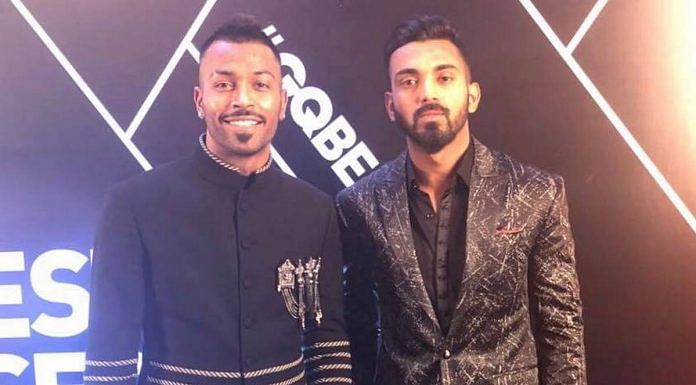It shows that women may finally matter.
Cricketers Hardik Pandya and KL Rahul’s ‘debut’ on the popular show Koffee with Karan brought under the spotlight an abominable Indian phenomenon: the loose talk culture.
The sportspersons aren’t the first to have made vulgar public comments about women, but they are among the very few who have paid for it.
‘Loose talk culture’: An affliction
You indulge in this ‘loose talk culture’ when you casually comment on the complexion, beauty or sexuality of women and walk away.
You are likely to gain a few admirers on the social media who will applaud your ‘sense of humour’ and call you ‘the life of the party’. What is worth noting is, among these admirers there will be women too.
Those liberal voices at work who speak on women’s issues often indulge in ‘loose talk’ when they are seen with the boys’ club.
Is it possible that those who, in the name of humour, berate women respect them? On the show, Pandya spoke about his ‘relations’ with cheerleaders. The problem here isn’t his association with cheerleaders but how he views them. He said that, at parties, he doesn’t bother asking their names—he just watches the ‘girls move’. It only shows that he doesn’t see women as humans.
Also read: Hardik Pandya & KL Rahul apologise for their sexist comments in Koffee With Karan
What is offensive?
In 2014, a celebrity ‘roast’ by comedy group All India Bakchod (AIB) stirred up a controversy because of its ‘offensive’ content. The video earned 7 million hits within 24 hours of going live. It was the top trend in India, and made AIB the channel attracting the most subscribers.
Social media was divided on whether the video—and AIB itself—should be banned over the roast, with one half calling for freedom of speech and the other questioning this freedom.
At the time, words like misogynist and sexist weren’t being used like they are in the context of the Pandya-Rahul controversy. AIB too had indulged in loose talk and used cuss words with abandon when making this viral video—while others watched them.
Supporters said there was nothing wrong with the video: Comedians like Varun Grover came out in support, while actor Sonakshi Sinha asked how you could send someone to jail for a good laugh. Karan Johar himself had said, “if it’s not your cup of tea—don’t drink it.”
On the other hand, actor Alia Bhatt wrote that people should learn the important lesson of not taking life too seriously and filmmaker Ram Gopal Verma went to the extent of saying the AIB video proved that India has moved out of the ‘Stone Age’.
Those arguing against it said ‘cuss words’ and references to ‘pornography’ were objectionable—they couldn’t find the right words to condemn the video.
Also read: Hotstar quietly removes Hardik Pandya Koffee with Karan episode, raises censorship concerns
In 2018, both Koffee with Karan and AIB episodes lay bare our ‘loose talk culture’.
It was offensive that Pandya admitted that, in the most objectionable way, he watched cheerleaders move. It was offensive that he bragged about his trophies as it were—speaking of how many women he had slept with. He sounded just like the character of Sanjay Dutt from Sanju, who brags about sleeping with 350 women.
But loose talk is not limited to ‘men’, this culture is pervasive. Take, for instance, the film Veere Di Wedding. It has highly problematic dialogues like “Are tu iski le le”—as obscene as Pandya’s confessions.
Veere Di Wedding was promoted in the name of women’s friendship and sexual freedom. During its promotions, the heroines said they had asked the makers to add more swear words to the script because that’s how people talk at home. Nothing is wrong with ‘swear words’ until you cross boundaries of decency.
Our leaders are not far behind. Congress leader Digvijay Singh had called a woman ‘tanch maal’. In 2013, then Gujarat CM Narendra Modi called Shashi Tharoor’s wife ‘50 crore girlfriend’. JDU leader Sharad Yadav has been accused of objectionable comments on several occasions.
Also read: We called out Hardik Pandya, now it’s time to call out colleagues, friends and family
#MeToo strikes
The journey from AIB to Koffee With Karan episodes has been revolutionary. Especially for women. Needless to say, #metoo has changed the way society thinks. Today, when we watch a web series we ask questions about its bold scenes and, more importantly, if the actress was mistreated while shooting them.
We also ask if such scenes are relevant to the script.
Look at the irony—in 2018, the very men who made ‘woke’ videos on women, such as Utsav Chakraborty and Gursimran Khamba, faced sexual harassment charges.
In 2019, BCCI has taken the criticism Pandya and Rahul received on social media seriously and suspended both the cricketers, pending enquiry.
There is hope yet that people will themselves end this culture of ‘loose talk’—not just on popular shows but also in their lives and begin to respect women.
The author is a freelance journalist.




Can anyone deny the fact that some women are sexually more attractive than others? Is it possible for a man to suppress his desire to fantasize on such women? When he is fantazising he is treating that woman as a sexual object. When two such fantazisors meet, they will talk about their fantasies. Women also fantacize exactly the same way and talk about men as sexual objects in the same way. Probably the only difference is that men may not object to their being treated as sex objects while women may not like it.